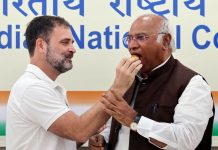“When investigating my age the police asked me if I’d gone to school,” he says. He told them he had left in the fifth grade, though he had actually left in the fourth.
“They went to my school,” he chuckles, “where they were told that I’d studied there. They searched the fifth grade records, but couldn’t find my name, so assumed that the record was lost.”
He spent a month and a half in the observation home. A little over a year later, he was arrested again for stealing money. His drug habit by now was much worse, and he was 20 years old. Miraculously, the same process repeated itself. Did the police not recognise him? “No, I was caught at a different police station.” The police kept no data on juvenile crime and so there was no way of catching repeat offenders or crosschecking their ages.
His deception went unnoticed by the Juvenile Justice Board, and would have gone undetected entirely had he not had a change of heart at the drug detox centre. “I had reached a point where I could no longer lie,” he says, “one day I told a magistrate the truth.”
His case has now been transferred to a regular court which, in acknowledgement of the initiative he has taken to reform himself, has let him out on bail. “It’s my de-addiction anniversary tomorrow,” he says sheepishly.
Delhi Police has just started keeping records of the age of the juveniles it arrests, but as of now there is no centralised database that would allow this information to be shared.
“No other country follows a system that prevents the police from keeping a person’s criminal record,” says Nalwa. “Should a boy who has been arrested for murder at the age of 17 be employed as a security guard at 19? Can someone who has molested a child be driving a school van?”
She feels that children have started believing that crime actually pays. That, in a city like Delhi with deep economic disparities, is a very dangerous thing. The distrust between the Juvenile Justice Board and the police has reached a point where the latter is simply no longer willing to cooperate. “They treat us like adversaries, but when it’s convenient, ask us to investigate cases. Why should we?” Nalwa says.
As a consequence, the police’s attempts at dealing with juvenile crime have been half-hearted. In mid-2012, NGO Pratidhi filed an RTI request asking the police for details on the number of cases that had been handled by Special Juvenile Police Units in Delhi’s districts.
In response, West District said they kept no records. The Central District said, “No such case was reported during the last one year.” The South District said that though it dealt with 49 cases of juvenile crime and 191 cases of children in need of protection, not one of them was handled by these specialised units. The district had only gotten around to hiring a social worker for this unit in May 2012.
The judiciary also, not surprisingly, finds itself isolated, and somewhat powerless. Anant Kumar Asthana heads a committee appointed by the Delhi High Court to oversee the running of institutions for juveniles in conflict with the law. He says he is going to file a case in the court compiling all the orders which have been issued on the directions of the committee that he heads, but have not been followed by the police or the Delhi government. He says, melodramatically, that he has been a complete “failure” at his job. If the children seem secondary while they are in the system, they are abandoned completely when they exit. There are no aftercare plans, or support.
Outside the juvenile board at Delhi Gate, a harried middle-aged woman runs after a police bus, talking to her son who is in it. She’s happy that he’s going to be released tomorrow. But this lady is also petrified. “This is the fourth time he’s been imprisoned. I wish someone would tell me what to do with him,” she pleads, as the bus turns and disappears.
Tomorrow she will take him back to Trilokpuri, and hope that he commits no more crimes.
akshai@tehelka.com













